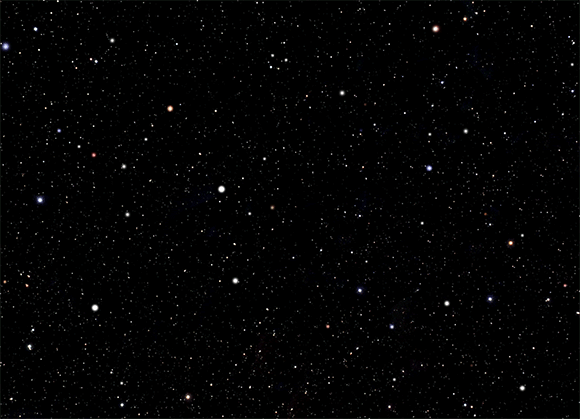Welcome to DU!
The truly grassroots left-of-center political community where regular people, not algorithms, drive the discussions and set the standards.
Join the community:
Create a free account
Support DU (and get rid of ads!):
Become a Star Member
Latest Breaking News
Editorials & Other Articles
General Discussion
The DU Lounge
All Forums
Issue Forums
Culture Forums
Alliance Forums
Region Forums
Support Forums
Help & Search
Science
Related: About this forumCould There be 100 Billion Potentially Habitable Planets in the Galaxy?

A visualization of the “unseen” red dwarfs in the night sky. Credit: D. Aguilar & C. Pulliam (CfA)
As we’ve reported recently, the likelihood of findings habitable Earth-sized worlds just seems to keep getting better and better. But now the latest calculations from a new paper out this week are almost mind-bending. Using what the authors call a “very careful extrapolation” of the rate of small planets observed around M dwarf stars by the Kepler spacecraft, they estimate there could be upwards of 100 billion Earth-sized worlds in the habitable zones of M dwarf or red dwarf stars in our galaxy. And since the population of these stars themselves are estimated to be around 100 billion in the Milky Way, that’s – on average – an Earth-sized world for every red dwarf star in our galaxy.
And since our solar system is surrounded by red dwarfs – very cool, very dim stars not visible to the naked eye (less than a thousandth the brightness of the Sun) — these worlds could be close by, perhaps as close as 7 light-years away.
With the help of astronomer Darin Ragozzine, a postdoctoral associate at the University of Florida who works with the Kepler mission (see our Hangout interview with him last year), let’s take a look back at the recent findings that brought about this latest stunning projection.
Back in February, we reported on the findings from Courtney Dressing and Dave Charbonneau from the Center for Astrophysics that said about 6% of red dwarf stars could host Earth-size habitable planets. But since then, Dressing and Charbonneau realized they had a bug in their code and they have revised the frequency to 15%, not 6%. That more than doubles the estimates.
Read more: http://www.universetoday.com/100767/could-there-be-100-billion-potentially-habitable-planets-in-the-galaxy/
5 replies
 = new reply since forum marked as read
Highlight:
NoneDon't highlight anything
5 newestHighlight 5 most recent replies
= new reply since forum marked as read
Highlight:
NoneDon't highlight anything
5 newestHighlight 5 most recent replies
Could There be 100 Billion Potentially Habitable Planets in the Galaxy? (Original Post)
n2doc
Mar 2013
OP
Lionessa
(3,894 posts)1. If so, let's hope we never find them or the way to reach them, given
the disrespect with which we treat our current planet.
shenmue
(38,584 posts)2. Here come the Martians. Everyone, duck!
Okay, I'm kidding.
I just hope the aliens can't see me when I shower. That would be weird.
Warpy
(114,507 posts)3. I like the philosophy that states life is an artifact of planets
and will exploit any environment it can, something that seems to be borne out by the nucleic acids they keep finding in space rocks.
The caveat here is "life as we know it," which depends on liquid water, which in turn depends on a very narrow temperature range.
arcane1
(38,613 posts)4. It would be fascinating to know how the environment, climate, etc, are like on those planets
Not to mention what the sky would look like, and the creative and literally other-worldly ways life would develop ![]()
TheMastersNemesis
(10,602 posts)5. Where Is The One We Can Send Republicans To?
